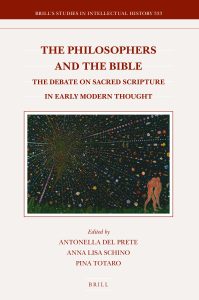 The Bible is the crucible within which were forged many of the issues most vital to philosophy during the early modern age. Different conceptions of God, the world, and the human being have been constructed (or deconstructed) in relation to the various approaches and readings of the Holy Scriptures. This book explores several of the ways in which philosophers interpreted and made use of the Bible. It aims to provide a new perspective on the subject beyond the traditional opposition “faith versus science” and to reflect the philosophical ways in which the Sacred Scriptures were approached. Early modern philosophers can thus be seen to have transformed the traditional interpretation of the Bible and emphasized its universal moral message. In doing so, they forged new conceptions about nature, politics, and religion, claiming the freedom of thought and scientific inquiry that were to become the main features of modernity.
The Bible is the crucible within which were forged many of the issues most vital to philosophy during the early modern age. Different conceptions of God, the world, and the human being have been constructed (or deconstructed) in relation to the various approaches and readings of the Holy Scriptures. This book explores several of the ways in which philosophers interpreted and made use of the Bible. It aims to provide a new perspective on the subject beyond the traditional opposition “faith versus science” and to reflect the philosophical ways in which the Sacred Scriptures were approached. Early modern philosophers can thus be seen to have transformed the traditional interpretation of the Bible and emphasized its universal moral message. In doing so, they forged new conceptions about nature, politics, and religion, claiming the freedom of thought and scientific inquiry that were to become the main features of modernity.
Contributors include Simonetta Bassi, Stefano Brogi, Claudio Buccolini, Simone D’Agostino, Antonella Del Prete, Diego Donna, Matteo Favaretti Camposampiero, Guido Giglioni, Franco Giudice, Sarah Hutton, Giovanni Licata, Édouard Mehl, Anna Lisa Schino, Luisa Simonutti, Pina Totaro, and Francesco Toto.
Table of Contents
- Introduction: Antonella Del Prete, Anna Lisa Schino, and Pina Totaro
Part 1 – Enquiring on Moses
- Images of Moses in the Renaissance: Simonetta Bassi
- More on Spinoza and the Authorship of the Pentateuch: Pina Totaro
Part 2 – Prophet’s Witnessing
- Tommaso Campanella on the Bible Ontology, Epistemology and Political Philosophy: Guido Giglioni
- Prophecy and the Prophetic Kingdom of God in the Hobbesian Analysis of the Holy Scriptures: Anna Lisa Schino P
- Hermeneutics and Conflict Spinoza and the Downfall of Exegetical Interpretation: Diego Donna
Part 3 – Rational Theology and Natural Religion
- The Bible in the Philosophy of Anne Conway and Henry More: Sarah Hutton
- “Between Doubt and Knowledge” John Biddle and the English Unitarians in the Time of Locke: Luisa Simonutti
- Immorality and Intolerance in the Bible? Natural Ethicality and the Interpretation of Scripture in the Writings of Pierre Bayle: Stefano Brogi
Part 4 – The Moral Message of the Bible
- Peace and Truth in Polemic: Pascal’s Pensées L974/S771: Simone D’Agostino
- An Association without Power? Gift, Recognition, and Democracy in the Hobbesian Conception of Early Christian Communities: Francesco Toto
- “The Law Inscribed in the Mind” On the Meaning of a Biblical Image in Spinoza’s Theological-Political Treatise: Giovanni Licata
Part 5 – The Accommodation Doctrine Restricted
- Firmamentum La querelle théologico-philologique du ciel étoilé, de Copernic à Kepler: Édouard Mehl
- L’exégèse du dernier Mersenne et le cartésianisme: Claudio Buccolini
- “Accommoder la Théologie à ma façon de philosopher” Descartes and Dutch Cartesians Interpreting the Bible: Antonella Del Prete
- Wolff, Spinoza, and the Interpretation of Scripture: Matteo Favaretti Camposampiero
- Natural Philosophy and Scripture in Isaac Newton’s Principia mathematica: Franco Giudice